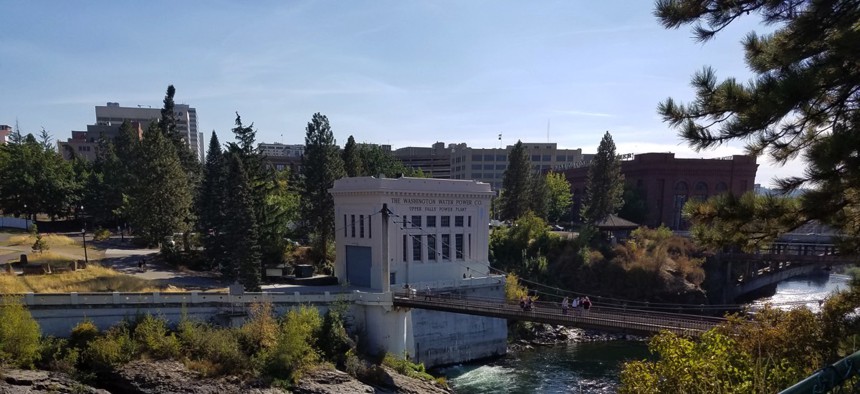Spokane Pursues Smart City Goals With Collaborative Approach

Spokane, Washington Michael Grass / Route Fifty.com
Urbanova is a living lab set in the heart of the 770-acre University District near downtown to "pilot technologies while testing what creates value and how economical they are."
Spokane, Washington’s second-largest city has long been a hub for the research of energy, air quality, health and biosciences, making it a unique setting for a new smart city living lab.
A little more than 40 years ago, the “Lilac City” was the smallest ever to host a World’s Fair, Expo ’74, the first such international event to focus on environmental issues.
That was back when many cities’ downtowns were being abandoned, but Urbanova—occupying the 770-acre University District adjacent to the urban core and inspired by similar collaborative efforts like Envision Charlotte—could strengthen Spokane's ongoing downtown revitalization.
“As you look at these urban issues facing infrastructure, especially those cities in the business of providing utilities … the reality is we need to do things in a much smarter way,” Spokane Mayor David Condon told Route Fifty in an interview.
Spokane’s municipal government, along with the local private utility Avista and Liberty Lake, Washington-based energy technology company Itron, have been working on their smart city endeavor for two-and-a-half years.
All local utilities are in compliance with the Clean Water Act, and the city is in the home stretch of its record-breaking Safer Stronger Smarter public works initiative—dealing with everything from the sale of green bonds for green infrastructure to stormwater reduction to the addition of recreational amenities like bike and running paths.
Reducing Spokane’s energy signature is also a top priority for local officials, but as been the case in many other cities, data integration can be a challenge. Urbanova presents the opportunity to link private-sector partners providing that data, much like Spokane has linked capital improvement projects under its streets through a single plan.
“We’ll pilot technologies while testing what creates value and how economical they are,” said Sharelynn Moore, Itron's global marketing and public affairs vice president.
That begins with smart LED streetlights, technical support of which comes through the White House's Envision America program. By December, 50 dimming streetlights, 10 with sensors monitoring air quality, will be installed throughout the University District. Noise detection sensors and accelerometers may be added later.
The connected light fixtures will begin compiling and correlating disparate sets of data through a common communications network that Spokane hopes to scale in time.
Itron currently provides communications infrastructure for local utilities—an open, IP-based smart metering platform the streetlights will lay the foundation for expanding.
Solar panels and more traditional utility assets will be connected to a shared microgrid between two buildings in the University District. From there, the city can manage loads and provide voltage and frequency support for critical needs during outages.
Six universities, two of which boast new medical schools, call Spokane home. Of those, the Washington State University Voiland College of Engineering and Architecture recently secured a smart city grant for atmospheric research and will study air quality and its health effects at the pedestrian level.
Urbanova partners—which also include Washington State University, the University District Development Association and Seattle-based engineering firm McKinstry—have other grant requests in and are mulling other pilots outside the first three.
“It’s up to each partner to determine, ‘What do I want to test?’” said Laurine Jue, Avista senior communications manager. “Not all outside partners are even realized yet.”
Officials in Spokane hope Urbanova will have international appeal.

Condon envisions connected sewer overflow tanks with cameras monitoring the city’s subterranean facility and grass-top playing fields with cutting-edge environmental tech underneath.
Liveability and sustainability are the primary aims of the Urbanova venture, and the live lab hasn’t even tapped into healthcare research in the University District. Spokane recently saw the opening of an integrated health care clinic, but imagine if the WSU College of Pharmacy started sharing data with the new med schools and vice versa.
“That sphere is where we can garner the most benefits for citizens,” Condon said.
There’s been talk of piloting smart homes that can assist with the care of Spokane’s aging population, as WSU is already performing significant research in the area and could team with nearby hospitals.
Urbanova hasn’t yet engaged the community, but workshops with neighborhoods and local stakeholders are being planned.
“There will be engagement of citizens, where there are those pieces, so the city really understands what’s going on there,” Condon said.
Dave Nyczepir is a News Editor at Government Executive’s Route Fifty and is based in Washington D.C.
NEXT STORY: A smart city power platform blooms






